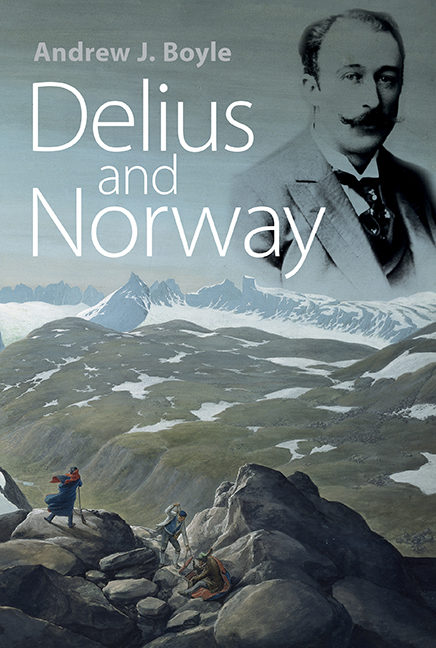Book contents
- Frontmatter
- Dedication
- Contents
- List of illustrations and tables
- Preface
- Abbreviations
- Selected glossary of landscape terms used in place names
- 1 Norway's awakening
- 2 1862–1888: Bradford, Florida and Leipzig
- 3 1888–1889: With Grieg on the heights
- 4 1890–1891: ‘C'est de la Norderie’
- 5 1892–1895: Norway lost
- 6 1896: Norway regained
- 7 1897: Front page news
- 8 1898–1902: Unshakeable self-belief
- 9 1903–1907: Breakthrough in Germany and England
- 10 1908–1912: Changes of direction
- 11 1912–1918: High hills, dark forests
- 12 1919–1934: Myth and reality in Lesjaskog
- Appendix I List of visits to Norway
- Appendix II Works with Norwegian and Danish texts and associations
- Selected bibliography and archival sources
- Index
3 - 1888–1889: With Grieg on the heights
Published online by Cambridge University Press: 30 August 2017
- Frontmatter
- Dedication
- Contents
- List of illustrations and tables
- Preface
- Abbreviations
- Selected glossary of landscape terms used in place names
- 1 Norway's awakening
- 2 1862–1888: Bradford, Florida and Leipzig
- 3 1888–1889: With Grieg on the heights
- 4 1890–1891: ‘C'est de la Norderie’
- 5 1892–1895: Norway lost
- 6 1896: Norway regained
- 7 1897: Front page news
- 8 1898–1902: Unshakeable self-belief
- 9 1903–1907: Breakthrough in Germany and England
- 10 1908–1912: Changes of direction
- 11 1912–1918: High hills, dark forests
- 12 1919–1934: Myth and reality in Lesjaskog
- Appendix I List of visits to Norway
- Appendix II Works with Norwegian and Danish texts and associations
- Selected bibliography and archival sources
- Index
Summary
‘For months our meeting in Wonderful Norway has filled my entire horizon’
Letter from Delius to Grieg, undated, but early June 1889By the summer of 1888, Delius was established in Paris, but his fascination with Scandinavia was directing his creative impulses. From then until his mountain tour with Grieg a year later there would come Norwegian composition after Norwegian composition:
• thirteen songs to texts by Norwegian poets
• Paa Vidderne, melodrama for orchestra and reciter
• Idylle de Printemps, symphonic poem originally with a Norwegian title and strongly influenced by Grieg
• sketches for incidental music to Ibsen's Keiser og Galileer (Emperor and Galilean)
Twelve of the thirteen Norwegian songs written in 1888 and 1889 were quickly published, first in a group of five in 1890, then a further group of seven in 1892 (see Table 1 on p. 40). All were settings of German translations. They were the first Delius compositions to be published and Grieg's influence with the Augener publishing house no doubt played its part. We can see from Table 1 that eight of the twelve texts chosen by Delius had already been set to music by Grieg. From our distance this might seem tactless, but it no doubt attests to Delius's almost blind admiration for his mentor. It should come as no surprise, then, that a handful of musical elements regarded as typifying Grieg's style have also found their way into Delius's songs. Among these can be mentioned sequences of seventh chords, the bass line falling by step, and key modulation and harmonic progressions directly from the tonic to the mediant. In a letter written to Delius after receiving some of the songs, Grieg stated that he found ‘so many beautiful and deeply felt things in them’, but continued: ‘And then again there are other things which are difficult to accept […] in the form and in the treatment of the voice. A Norwegian melody and a Wagnerian treatment of the voice are dangerous things indeed to try to reconcile.’
A comparison of the composers’ interpretations offers us some interesting insights, although in two instances, ‘Cradle Song’ and ‘The Homeward Way’, Delius's early efforts are being compared to songs that are among the most successful in Grieg's output.
- Type
- Chapter
- Information
- Delius and Norway , pp. 39 - 65Publisher: Boydell & BrewerPrint publication year: 2017



